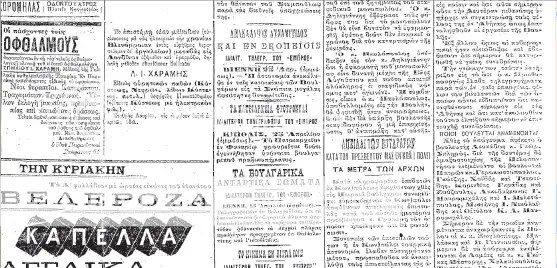Alexander the Great:
- Origins of Alexander
- Is Alexander the Great Greek?
- The Destruction of Thebes
- Plutarch on Alexander’s bringing Greek civilisation to Asia
- Letter to Darius
- Literary ancient sources about Alexander’s drinking
- Ancient Sources about Alexander’s Panhellenic Campaign
- Bible about Alexander the Great
- Alexander King of Yavans
- Modern Historians about ancient Macedonia NEW
- Ancient Sources about ancient Macedonia NEW
- Ancient Macedonian Testimonies about their own Ethnicity
- Nicholas Hammond’s Interview about Macedonia
- Etymology of 100 most famous ancient Macedonian Names
- Ancient sources about Alexander’s army Greek character
- Ancient sources about Macedonia as a Greek Land
- Ancient Greeks references to Macedonians as Greeks
- Was Greek the ‘Linqua franca’ of ancient times prior to Alexander
- Falsified versions and mistranslations of ancient sources about Macedonia
- King Archelaos and his portrayal as ‘Barbarian’
- Modern Historians about Macedonian Royal House
- Eminent Macedonians among Greek mercenaries of Darius
- Greek Navy in Alexander’s campaign
- Sibylline Prophesies
- Olympia in Dion
- Ancient Macedonians in Olympic games
- Persian Story of Zulqarneen
- The Hellenization’s argument contradiction
- Prof. Badian’s views about the incident of Eumenes – Xennias
- List of known non-Macedonian Greeks in Alexander’s army
- Ancient Macedon and Thessalia – Case of Jason of Pherai
- Philip fulfiled his mentor’s Epaminondas dream to unite Greece
- Cults in Ancient Macedonia
- Eurypides and Macedonians
- The Heracleid origin of ancient Macedonians
- Hadrian, Thessalonica and Panhellenion League
- Justin sources – Marsyas of Macedon
Linguistics :
- Modern linguists about Ancient Macedonian language
- The Language of ancient Macedonians
- Ancient Macedonian language – Hoffman
- Ancient Macedonian Language Part II
- Ancient Macedonian Language Part III
- Ancient Macedonian Language Part IV
- Ancient Macedonian Language Part V
- Ancient Macedonian Language by Marcus Templar
- Ancient Macedonian language recognized as Greek dialect
- The misuse of the term Philhellene during Antiquity
Biographies:
- Nicesipolis of Pherae
- Cynane
- Thessalonike
- Byzantine Sources about greekness of Medieval Macedonia
- List of famous Medieval Macedonians
- Sources on St’ Cyril and Methodius Greek Ethnicity
- 14th Century Names of Lay Proprietors in the Themes of Thessaloniki and Strymon
- Macedonia in the 16th and 17th Centuries
- Macedonia preceeding Turkish Occupation
- The final capture of Thessalonica by Turks (1430)
- Ancient/Modern Sources about Thessalonica
Modern History of Macedonia
- Greek schools of Pelagonia during 19th cent.
- Greek Macedonian newspapers of late 19th cent.- early 20th cent.
- Four of the best Historians, describe Balkans in 1915
- Books in Greek education prior to 1936 about Macedonia
- Paidomazoma – Communist children abductions in the Greek civil war
F.Y.R.O.M Propaganda
- Modern Writers about the Bulgarian origin of FYROM’s slavs POPULAR
- Indisputable Evidence of FYROM’s Slavs being originally Bulgarians
- FYROM’s revisionist falsifications – Rejected by the World’s academia
- Linguistic origins of F.Y.R.O.M – From Bulgarian dialect to “Macedonian” language
- The Ethnic and Historical origins of FYROM Part I
- The Ethnic and Historical origins of FYROM Part II
- The Ethnic and Historical origins of FYROM Part III
- The Ethnic and Historical origins of FYROM Part IV
- The Ethnic and Historical origins of FYROM Part V
- The Ethnic and Historical origins of FYROM Part VI
- The Ethnic and Historical origins of FYROM Part VII
- The Ethnic and Historical origins of FYROM Part VIII
- Fighting Fyrom Propaganda #1 – Tzar Samouel
- 1910 Census and fabrications
- The so-called FYROM’s claim about “occupation” of Macedonia in 1913 exposed
- Letter from FYROMs Slavs to Oliver Stone
- Propaganda of FYROMs site HistoryofMacedonia.Org exposed – Part I
- Propaganda of FYROMs site HistoryofMacedonia.Org exposed – Part II
- Propaganda of FYROMs site HistoryofMacedonia.Org Exposed – Part III
- Propaganda of FYROMs site HistoryofMacedonia.Org Exposed – Part IV
- BIG Stefov Lie # 6 ,”Greeks Are a Superior Race”
- BIG Stefov Lie # 8,”Tito created the Macedonian Nation”
- BIG Stefov Lie # 10, ‘Greeks are Turks, Albanians, Slavs and Vlachs
- Big Stefov Lie #11, ‘Saint Cyrill and Methodios are Greek’
- BIG Stefov Lies # 17: “Ancient Macedonians were not Greeks“
- Big Stefov Lies # 18_”Philip II United the Greeks”
- BIG Stefov Lie # 19 “4,000 years of Greek Civilization
- BIG Stefov Lie # 20_The Final Answer in His Lies
- Fyrom’s lies over Slavic populations genetics Part I
- Fyrom’s lies over Slavic populations genetics Part II.
- Modern Bulgarian Heroes…claimed by FYROM
- Fake Letter from Alexander in…nationalistic site of FYROM
- De-Bulgarization and persecutions of Bulgarians in FYROM
- Diplomatic Sources on Ilinden – a Bulgarian Uprising
- FYROM’S History Books and propaganda: Facts
- Free Archbishop Jovan from prison in FYRO Macedonia F.A.Q – Frequently Asked Questions on Macedonia by Alexandros Gerbessiotis
FALLACIES AND FACTS ON THE MACEDONIAN ISSUE – Marcus Templar

Medieval History of Macedonia
- http://historyofmacedonia.wordpress.com
- www.lysimachos.com
- www.macedoniaontheweb.com/forum/


















You must be logged in to post a comment.